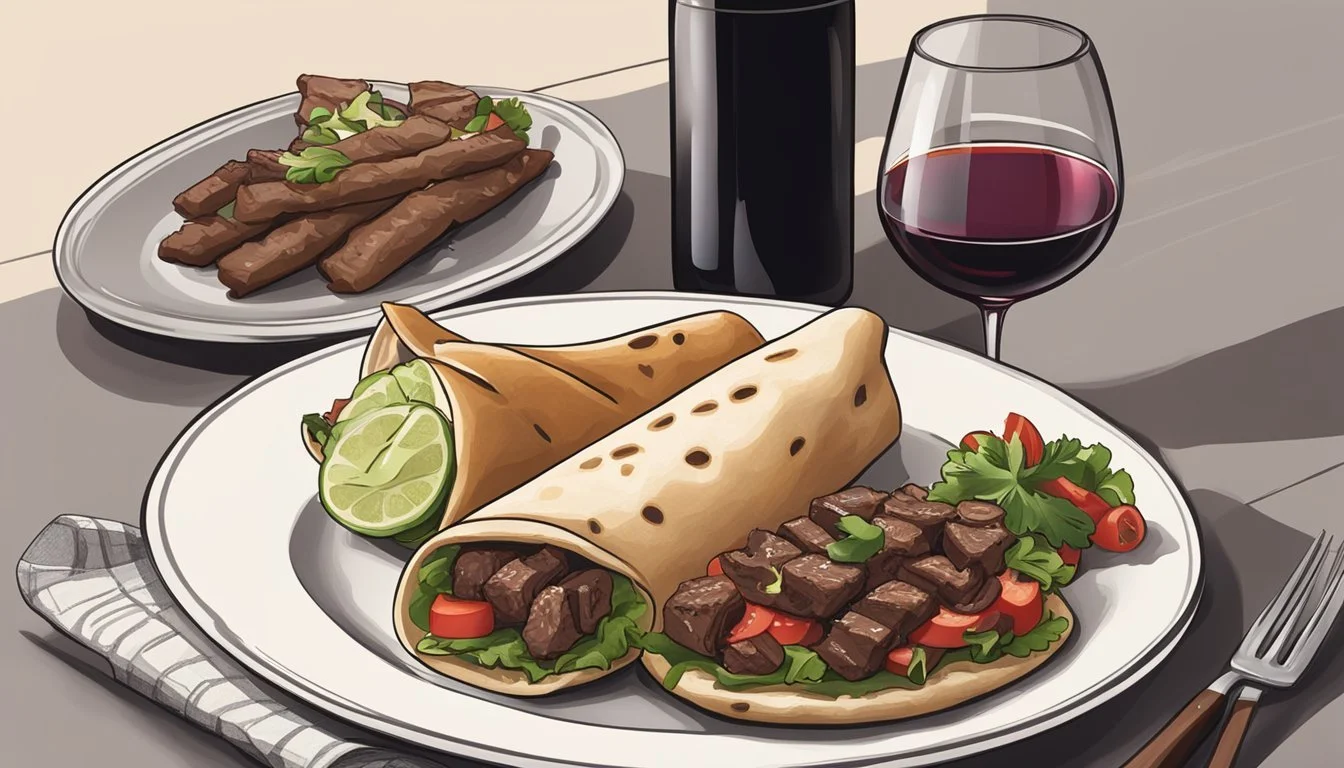What Wine Goes Well with Beef Gyros
Expert Pairing Tips
Selecting the perfect wine to complement beef gyros (What wine goes well with beef gyros?) can enhance the dining experience, marrying the rich flavors of the meat with the appropriate notes of a well-chosen bottle. Beef gyros, a delicious street food favorite, are traditionally made with savory slices of seasoned beef, often accented with tangy sauces and fresh vegetables, wrapped in soft, warm pita bread. The complexity of flavors in this Greek dish calls for a wine that can stand up to its robust taste without overpowering it.
A medium-bodied red wine is generally a reliable choice for beef gyros. Varieties such as Syrah or an earthy Greek Agiorgitiko can balance the meat's heartiness with their fruit-forward character and hints of spice. These wines mirror the aromatic spices in gyros while maintaining a palate that complements rather than competes.
For an alternative, a bold yet balanced Zinfandel could also be a thoughtful pairing. Its peppery undertones and burst of dark berry flavors resonate with the grilled essence and spice mix of the gyro. The key to the perfect pairing is choosing a wine that bridges the gap between the zestof the beef and the freshness of the toppings, enveloping the senses in a harmonious blend of taste and aroma.
Understanding Gyros
The gyro is a Greek dish known for its savory meat, fresh vegetables, and creamy sauces (What wine goes well with creamy sauces?), all wrapped in soft pita bread. It's a street food classic that's beloved worldwide.
Key Components of a Gyro
A traditional gyro consists of a few essential components wrapped in a warm pita. Meat is the centerpiece, with beef, lamb, chicken, or pork options commonly used, seasoned with a blend of spices for a distinct flavor profile. Gyros are often garnished with vegetables such as lettuce, tomatoes, and onions. The addition of tzatziki sauce, a cool, creamy sauce made with yogurt, cucumber, garlic, and herbs, complements the savory meats and adds a signature taste to the dish.
Meat: Beef, lamb, chicken, or pork
Vegetables: Lettuce, tomatoes, onions
Sauce: Tzatziki
Bread: Pita
Variations of Gyros: Beef, Lamb, and Chicken
While the classic Greek gyros typically feature lamb or a mixture of lamb and beef, there are several variations, including ones with beef, chicken, or pork as the primary meat. Beef gyros are known for their robust flavor and are often preferred for their tender texture. Lamb gyros carry a distinct, rich taste, heightened with herbs and spices. Chicken gyros offer a lighter alternative, with meat that's marinated and cooked to deliver a juicy, flavorful experience. Each variation maintains the integrity of the gyro with the complementary trio of meats, vegetables, and sauce, wrapped in pita bread.
Beef Gyros: Robust and tender
Lamb Gyros: Rich and herbed
Chicken Gyros: Light and flavorful
Basics of Wine Pairing
When selecting a wine to pair with beef gyros, understanding the fundamental wine flavor profiles and the significance of acidity, tannins, and body can lead to a harmonious match that enhances the dining experience.
Wine Flavor Profiles
Wine flavor profiles vary greatly depending on the grape variety, the region where it is grown, and the winemaking process. Typically, wines are categorized by their primary flavors:
Red Wines: Often have notes of dark fruits, such as berry or plum, and may include earthy or spicy undertones. For beef gyros, one might consider a red with medium to bold flavors that can stand up to the spiced meat.
White Wines: Usually feature lighter, sometimes citrusy or floral, flavors. They can provide a crisp contrast to the rich flavors of a gyro but are generally less common as a pairing with red meat.
Rosé Wines: Strike a balance between red and white wines, often with hints of red fruits such as strawberries or cherries, and can be a refreshing complement to a variety of dishes, including lighter meat like beef in gyros.
The Importance of Acidity, Tannins, and Body in Pairing
Acidity: Wines with higher acidity can cut through the fattiness of beef, refreshing the palate between bites. A wine with balanced acidity will not overpower the savory aspects of the gyro but bring out its robust flavors.
Tannins: Present primarily in red wines, tannins provide structure and can enhance the wine's ability to match the texture of the meat. The astringency of tannins is softened by protein, making certain red wines excellent companions to beef gyros.
Body: This is a term used to describe the weight and fullness of a wine in the mouth. Full-bodied wines usually pair well with heartier dishes. Therefore, a medium to full-bodied wine would be suitable for the hearty nature of beef gyros. Conversely, a light-bodied wine might be overwhelmed by the dish's richness.
Selecting a Greek wine, such as a medium-bodied Agiorgitiko or a bold Xinomavro, can lend authenticity to the meal, as these wines are crafted to complement the flavors of Greek cuisine.
Analyzing Beef Gyros and Wine Pairings
The intricacies of pairing wine with beef gyros revolve around the flavors and textures of the meat, as well as the bouquet of spices and herbs present in the dish. Identifying a wine that complements these elements is key to enhancing the dining experience.
Gyro Meat and Wine Compatibility
Beef gyros, a staple of Greek cuisine, often present a savory flavor profile with a hint of smokiness from the grill. The meat is usually seasoned generously, and the combination of beef with complementary flavors of garlic, onion, and pepper requires a wine that can hold its own without overpowering the dish. A red wine with earthy aromas and a medium body offers a fitting counterbalance to the richness of the gyro meat. Specific varieties that pair well include:
Syrah: Offers peppery notes that echo the spices in the gyro.
Merlot: With a softer profile, it enhances the beef without competing with its flavors.
Cabernet Sauvignon: Bold enough to complement the robust taste of the gyro.
Spices and Herbs Influence on Wine Selection
The spices and herbs used in beef gyros, such as oregano, thyme, and rosemary, introduce a layer of aromatic complexity to the dish. They often invite a wine that has a touch of spice, contributing to a harmonious blending of palates. These herb notes should be considered when selecting a wine, as they can either be mirrored in the beverage’s profile or balanced by it. Wines with slight spice or herb notes themselves often make for a good match:
Zinfandel: Known for its spicy character that can complement the gyro's seasoning.
Grenache: Typically exhibits spice and fruit, offering a nice juxtaposition to the herbs.
When considering the sauce often served with gyros, such as tzatziki, a white wine with good acidity like Sauvignon Blanc might also be a good choice to cut through the richness of the sauce and meat. However, for those preferring red wine, it’s advisable to opt for something with a balance of tannins and acidity to navigate both the spices in the gyro and the creamy sauce.
Red and White Wine Suggestions
When pairing wine with beef gyros, one should consider the robust flavors of the meat and the accompanying condiments. The objective is to choose wines that complement these elements without overpowering them.
Pairing with Red Wines
Pairing beef gyros with red wine is a decision that benefits from selecting varieties boasting generous fruit notes and moderate tannins. Zinfandel, with its robust profile and fruit-forward character, is an excellent choice to handle the savory spices of gyros. Syrah or Shiraz is another apt selection, offering peppery undertones that find harmony with the seasoned beef. For those who prefer something less intense, a Pinot Noir can offer a lighter body with enough complexity to enhance the gyro's flavors.
Zinfandel: Fruit-driven with moderate tannins.
Syrah/Shiraz: Peppery undertones that complement seasoned beef.
Pinot Noir: Lighter body, yet complex enough to match the gyro's flavors.
White Wines and Rosés for Beef Gyros
White wines, especially those with a good acidity like Chardonnay or Assyrtiko from Crete or Macedonia, can cut through the richness of the meat. The tangy, refreshing profile of a Rosé can similarly cleanse the palate and offer a contrasting taste experience. A crisp Sauvignon Blanc can also work well, particularly if the gyros are accompanied by a yogurt-based sauce like tzatziki.
Chardonnay: Good acidity to balance the richness of beef.
Assyrtiko: A vibrant Greek white wine with citrus notes.
Rosé: Offers a refreshing palate cleanse.
Sauvignon Blanc: Crisp and complementary to yogurt-based sauces.
Greek Wine Varietals to Consider
For an authentic experience, one may explore Greek wine varietals. Agiorgitiko from the Peloponnese region is a red wine that pairs well with the spices in a beef gyro. The indigenous Greek varietal Limnio, once praised by Aristotle, is known for its balance of tannins and acidity, making it a noteworthy companion. Among whites, Savatiano is a less acidic option that harmonizes with flavorful meats, while the resin-flavored Retsina could offer an intriguing contrast.
Agiorgitiko: Spicy notes, pairs well with beef gyros.
Limnio: A balanced varietal with historical roots.
Savatiano: Harmonizes with savory dishes.
Retsina: A unique resin-flavored wine for bold palates.
Ideal Wine Characteristics for Beef Gyros
When selecting wine to pair with beef gyros, the ideal choices are those that can cut through the rich flavors and complement the spicing of the dish. Wines with moderate to high acidity and those that bring complementary spice notes to the table are typically favored.
Wines with Moderate to High Acidity
Acidity in wine is crucial for cutting through the savory and often fatty nature of beef gyros. Wines with high acidity can balance the rich meat and refresh the palate between bites.
Examples:
Zinfandel: Known for moderate acidity with a profile rich in dark berry flavors, which can contrast well with the savory meat.
Cabernet Sauvignon: Often brings a balance of acidity and silky tannins, providing a structure that stands up to the meat's texture.
Selecting Wines with Complementary Spice Notes
The spices in a beef gyro, such as pepper and aromatic herbs, harmonize well with wines that have their own spice-driven profile.
Characteristics:
Spice Notes: Look for wines that exhibit notes of black pepper or other warm spices.
Fruitiness: A wine with fruit-forward characteristics can offer a sweet contrast to the spices, featuring either dark berries or tree fruit notes.
Wines that are aged in oak might impart hints of smokiness or vanilla, which can echo the wood smoke often associated with the gyro's cooking process.
Non-Traditional Wine Pairings
While classic pairings are common, exploring non-traditional wine options can lead to delightful surprises when combined with beef gyros. This section uncovers whites with an adventurous streak and reds that are bold and unconventional, making the gyro experience unique.
Adventurous White Wines
Riesling: Traditionally not paired with beef, an off-dry German Riesling cuts through the richness of the gyro meat with its high acidity and stone fruit notes, especially when the gyro includes spicy toppings or sauces.
Dry Riesling: A dry Riesling brings a crispness that complements the tangy flavors of the gyro's yogurt sauce.
Sauvignon Blanc: Its zesty and sharp profile can be a delightful contrast to heavily seasoned and rich beef slices in a gyro, matching well with any herbal undertones.
Bold and Unconventional Reds
Malbec: Known for its plummy flavor and velvety finish, Malbec can bring a bold new dimension to beef gyros, pairing especially well with garlic and onion components.
Tannins: Wines with higher tannin, such as a robust Malbec, stand up to the beef's umami and fat content.
Merlot: A softer option, Merlot provides a fruity counterbalance that can enhance the beef without overpowering it, thanks to its medium tannin levels and complementary dark fruit flavors.
While these pairings may stray from the convention, they offer a chance to explore how different wine characteristics can enhance the myriad of flavors found in beef gyros.
Gyro Accompaniments and Wine
Selecting the right wine to go with beef gyros goes beyond the meat—it also involves considering the array of toppings and sides that complete the dish. Tzatziki sauce and fresh vegetables add a cooling contrast, while sides like Greek salad contribute additional flavors that can influence the wine pairing.
Pairing Wines with Tzatziki and Vegetables
Tzatziki, a yogurt-based cucumber sauce, is a quintessential accompaniment to beef gyros. Dry rosé wines complement the sauce's tangy profile without overpowering it. When vegetables like tomatoes, onions, and cucumbers are involved, light-bodied white wines such as an unoaked Chardonnay or Sauvignon Blanc can offer a crisp counterpart to the freshness of the produce. Wines with balanced acidity are ideal to meld harmoniously with the tzatziki and the natural zest of the vegetables.
Suggested Wine Pairings:
Tzatziki: Dry rosé, Sauvignon Blanc
Fresh vegetables: Unoaked Chardonnay, Albariño
Wine for Gyro Sides and Salads
Gyro sides often include Greek salad, spanakopita (spinach pie), and various vegetarian dishes (What wine goes well with vegetarian dishes?) like briam—a baked vegetable dish. A Greek salad drizzled with olive oil-based dressing and speckled with feta cheese calls for a wine with enough acidity to cut through the richness while matching the salad's vibrancy. Assyrtiko—a mineral-driven white wine from Greece, provides that balance. Spanakopita's savory spinach and feta filling is well-suited to the herbal notes of a crisp Verdejo. Vegetarian options such as briam, which includes a medley of oven-roasted vegetables, harmonize beautifully with medium-bodied red wines, like a Grenache or an earthy Pinot Noir, to complement the robust flavors.
Wine Recommendations:
Greek salad with feta and olive: Assyrtiko, Sauvignon Blanc
Spanakopita: Verdejo, Dry Riesling
Briam and other vegetarian dishes: Grenache, Pinot Noir
Serving and Presentation Tips
When serving beef gyros with wine, the temperature of the wine and the presentation of the dish are key to enhancing the overall dining experience. These factors can influence the way flavors are perceived, tying together the rich Greek heritage of gyros and the sophisticated notes of the selected wine.
Optimal Wine Serving Temperature
Red Wines: Serve between 60°F to 65°F (15°C to 18°C) to complement the savory beef.
Fuller-bodied reds, like Zinfandel or Syrah, are best slightly below room temperature.
White Wines: Serve chilled at 50°F to 55°F (10°C to 13°C) if preferring a white with spicy gyros.
A crisp white, such as Sauvignon Blanc, can balance the robust flavors when served cool.
It's important to note that serving wine too warm or too cold can mask its flavors and aromatics, which are integral to pairing with a flavorful dish like beef gyros.
Presentation of Gyros with Wine
Gyros Plating: Display the beef gyros on a clean, white plate to highlight its vibrant ingredients.
Accompaniments: Consider adding a sprig of parsley or a lemon wedge for a pop of color.
Wine Glass: Choose the appropriate glassware to enhance the wine's aroma.
A proper red wine glass for bold reds or a narrower white wine glass for whites.
Careful presentation allows for the Mediterranean street food origins of the gyros to shine through, while still grounding the meal in a sense of occasion that pairs well with the chosen wine.
Conclusion
When selecting a wine to accompany beef gyros, one must consider the robust flavors and spices characteristic of this Mediterranean dish. Beef gyros, often seasoned with herbs like rosemary and thyme, and served with tangy tzatziki sauce, demand a wine that can complement the blend of tastes without overpowering them.
Red Wines:
Syrah/Shiraz: Offers a peppery note which aligns well with the spicing of beef gyros.
Merlot: Known for its soft tannins, it pairs nicely with the succulence of the beef.
Cabernet Sauvignon: A full-bodied option that matches the heft of the gyro.
White Wines: For those who prefer white wines, a bolder choice is advisable to stand up to the flavors of beef gyros:
Chardonnay: Look for unoaked versions to maintain a balance with the gyro's spices.
Viognier: Its aromatic profile can enhance the herbs and seasonings in the dish.
Table: Suggested Serving Temperatures
Wine Type Serving Temperature Red Wine 60-65°F (15-18°C) White Wine 50-55°F (10-13°C)
In making a wine pairing decision for beef gyros, customers should feel confident in their culinary choices. To best enjoy the pairing, serve red wines slightly below room temperature and white wines chilled. Remember, the goal is to complement the gyro's flavors, not to compete with them.
By following these pairing suggestions, any enthusiast can enhance their dining experience of Greek cuisine, ensuring each bite of beef gyro is as delightful as the last.







